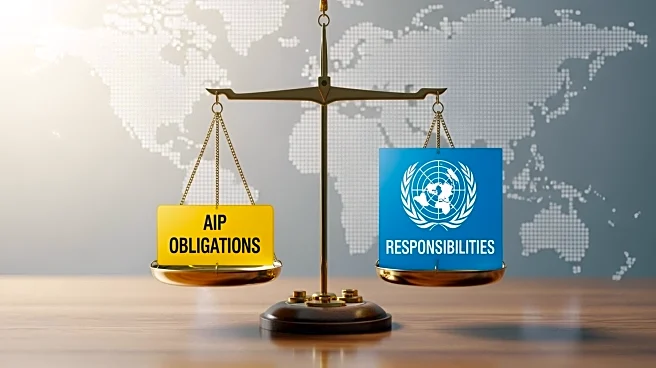What's Happening?
The International Court of Justice (ICJ) is set to provide an advisory opinion regarding Israel's legal obligations towards United Nations agencies and other international organizations operating in the occupied West Bank and Gaza Strip. This follows
a request from the UN General Assembly after Israel's parliament enacted laws prohibiting activities by the UN agency for Palestinian refugees (Unrwa) on Israeli territory. Israel has accused Unrwa of infiltration by Hamas, a claim the agency denies. The ICJ will also address Israel's duty to allow the unhindered delivery of essential supplies to Palestinians. Israel has tightened its blockade on Gaza, restricting aid entry, which has led to significant food insecurity. The ICJ's opinion, while non-binding, carries substantial moral and diplomatic weight.
Why It's Important?
The ICJ's forthcoming opinion is significant as it addresses the broader implications of Israel's actions on international humanitarian law and the functioning of UN agencies. The decision could influence diplomatic relations and international perceptions of Israel's policies in the occupied territories. It highlights the tension between Israel's security concerns and its obligations under international law as an occupying power. The outcome may affect the delivery of humanitarian aid and the operations of UN agencies, impacting the lives of millions of Palestinians. The case underscores the challenges faced by international institutions in enforcing their mandates when confronted by major member states.
What's Next?
The ICJ's opinion may prompt further diplomatic discussions and potential actions by the UN and its member states. Israel's response to the opinion could influence its future interactions with UN agencies and its policies in the occupied territories. The international community may increase pressure on Israel to comply with humanitarian obligations, potentially affecting aid delivery and regional stability. The decision could also lead to broader debates on the role and authority of international legal bodies in resolving conflicts involving sovereign states.
Beyond the Headlines
The case raises ethical and legal questions about the balance between national security and humanitarian obligations. It may set a precedent for how international law addresses conflicts between state sovereignty and the rights of occupied populations. The ICJ's opinion could influence future legal interpretations of international humanitarian law and the responsibilities of occupying powers. It also highlights the ongoing struggle for legitimacy and authority faced by international institutions in enforcing their mandates.















